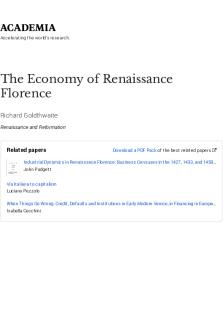Study Guide for The Spirit of the Renaissance (FDWLD201-01) PDF

| Title | Study Guide for The Spirit of the Renaissance (FDWLD201-01) |
|---|---|
| Author | Ejoke Ekpagha |
| Course | World Foundations Ii |
| Institution | Brigham Young University-Idaho |
| Pages | 3 |
| File Size | 64.4 KB |
| File Type | |
| Total Downloads | 107 |
| Total Views | 177 |
Summary
Study Guide for Weekly Quiz...
Description
Study Guide for The Spirit of the Renaissance This study guide contains all the questions on the quiz for the movie. Before you view the movie, read through the questions in this study guide. As you view the movie, select the correct answers for the following questions. When you find an answer, pause the movie and answer the question. All questions are either True/False or Multiple Choice. There may be more than one true answer in the multiple-choice questions. When you have finished viewing the movie, review your answers and take the quiz. You may use your notes as you take the quiz. However, do not collaborate with other students in finding the answers or taking the quiz. Doing so only decreases your ability to gain the knowledge and skills you need to pass this course. 1. He was called by nineteenth century scholars the “Father of the Renaissance” and the “Father of Humanism.” a. Johannes Kepler b. Florentine Medici c. Francesco Petrarca d. Dante Alighieri 2. Renaissance is French for “rebirth.” The “rebirth” occurred in which areas? a. Art b. Philosophy c. Literature d. All of the above e. a and c 3. What one idea, according to the presentation, marked the Renaissance from the Middle Ages? a. Pragmatism b. Nepotism c. Humanism d. Antiquarianism 4. For Renaissance scholars, the literature and philosophy of Greece and Rome represented the best that had been thought and written by man. True False
5. Humanism is which of the following? a. Imitation of the classic style such as Cicero b. Viewing the Middle Ages as a dark age of barbarism c. Emphasis on dealing with human problems in a human way d. Emphasis on human achievements e. All of the Above f. c and d 6. 1453 marked a significant year in all of human history because a. The Fall of Constantinople forced Greek-speaking scholars to congregate in Florence. b. Giovanni Boccaccio published The Decameron. c. Plutarch discovered Pluto. d. Ghenghis Khan took over Rome. 7. The ideal of the educated gentleman included which of the following? a. Eloquence in speech and writing b. Proficiency in horsemanship and archery c. Virtue and integrity d. Becoming an accomplished musician and possessing drawing skills e. All of the above f. a, c, and d 8. There is little tension between humanistic secularism and religious devotion, even today. True False 9. Which of the following humanists demonstrated that the “Donation of Constantine” was a forgery? a. Lorenzo Valla b.Thomas More c. Desiderius Erasmus d. Martin Luther 10. Thomas Aquinas in his Summa Theologiae, used which philosopher as the main source to help him establish a definitive guide to Catholic doctrine? a. Plato b. Aristotle c. Archimedes d. Socrates 11. The center of Platonic studies during the fifteenth century was located in which city?
a. Venice b. Naples c. Milan d. Florence 12. The Platonic philosopher who attempted to harmonize Arab, Christian, Hebrew, and classical Greek philosophy and theology was a. Giovanni Pico della Mirandola. b. Cosimo de’ Medici. c. Francesco de Francesca. d. Dante Alighieri. 13. Which country failed to unify under an absolute monarch or despot during the Renaissance? a. Spain b. France c. Italy d. England 14. Machiavelli argued that the state provides it’s own justification. In one stroke, he separated politics from Christian ideology and placed it squarely in the secular world. True False 15. Which discovery (according to the presentation) was the most important during the Renaissance era? a. Columbus discovering the Americas b. Johannes Gutenberg discovery of moveable type c. Vasco da Gama discovering the eastward route to Asia d. Magellan discovering the way to circumnavigate the globe...
Similar Free PDFs

The Spirit of Laws
- 2 Pages

\'The Spirit of Geneva\'
- 7 Pages

Spirit of the Beehive - Grade: A
- 8 Pages

The Renaissance: Key Concepts
- 6 Pages

The Harlem Renaissance
- 3 Pages

Spirit studio user guide
- 38 Pages
Popular Institutions
- Tinajero National High School - Annex
- Politeknik Caltex Riau
- Yokohama City University
- SGT University
- University of Al-Qadisiyah
- Divine Word College of Vigan
- Techniek College Rotterdam
- Universidade de Santiago
- Universiti Teknologi MARA Cawangan Johor Kampus Pasir Gudang
- Poltekkes Kemenkes Yogyakarta
- Baguio City National High School
- Colegio san marcos
- preparatoria uno
- Centro de Bachillerato Tecnológico Industrial y de Servicios No. 107
- Dalian Maritime University
- Quang Trung Secondary School
- Colegio Tecnológico en Informática
- Corporación Regional de Educación Superior
- Grupo CEDVA
- Dar Al Uloom University
- Centro de Estudios Preuniversitarios de la Universidad Nacional de Ingeniería
- 上智大学
- Aakash International School, Nuna Majara
- San Felipe Neri Catholic School
- Kang Chiao International School - New Taipei City
- Misamis Occidental National High School
- Institución Educativa Escuela Normal Juan Ladrilleros
- Kolehiyo ng Pantukan
- Batanes State College
- Instituto Continental
- Sekolah Menengah Kejuruan Kesehatan Kaltara (Tarakan)
- Colegio de La Inmaculada Concepcion - Cebu









